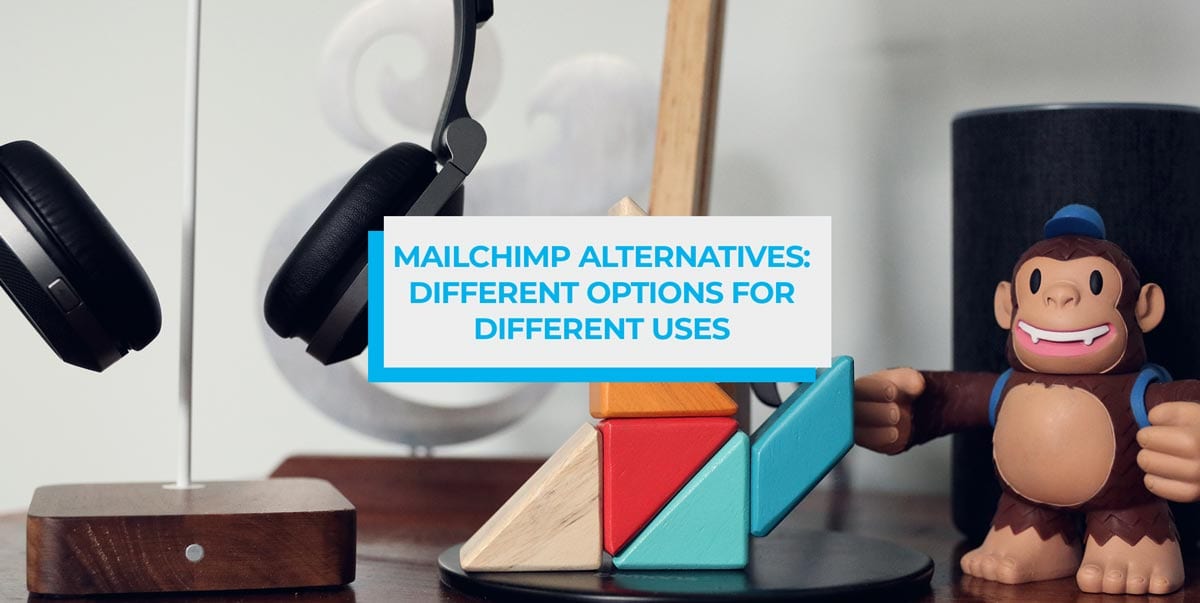When you think of email marketing tools, the first name that probably comes to mind is Mailchimp.
There’s a reason for this. Namely its popularity with people using it for a wide range of email marketing purposes. This is largely thanks to the variety of different tools Mailchimp offers. Everything from your standard email newsletter, to sending physical postcards in the mail.
Having a free plan also doesn’t hurt with growing their presence.
Having a finger in every pie means that Mailchimp quite often spreads itself too thin though. Their focus on so many different industries usually results in features that are not up to the standard you need as you grow.
Put another way, Mailchimp is a jack-of-all-trades and a master of none.
So while it might be a great option when you’re first getting started, soon you’ll find yourself booted off the free plan and looking for more powerful features. That’s where the search for a Mailchimp alternative starts.
To help speed up this process, we’ve created this list of the most common different use cases for Mailchimp. For each case we’ve listed a Mailchimp alternative that we think will serve you much better.
Basic Newsletter Mailchimp Alternative
Mailchimp’s original sole use remains it’s strongest suit: sending out an email blast. There’s no denying Mailchimp’s a great tool to do this, however all the other features you don’t necessarily need add to the price you pay for the service. This becomes especially relevant the more your email list grows.
Sometimes you’re just after an email marketing platform that’s cheaper than Mailchimp.
For this, we recommend Elastic Mail.
Despite it not being the cheapest solution to sending bulk emails, Elastic Mail has enough features to make it a true Mailchimp alternative. All while remaining much more affordable than Mailchimp.
In terms of Elastic Email’s feature set, they have everything you would expect, including:
- Modern email template editor
- List Segmentation
- Autoresponders
- Subscription forms
- API access
- Unlimited sending
- Analytics
If you’re just looking for basic email marketing software without all of the extra features for more specialized users, Elastic Mail is the perfect fit
When it comes to pricing, you also stand to save a significant amount. Let’s say you have 100,000 contacts, with Mailchimp’s Standard Plan that would set you back $499 a month. Whereas with Elastic Mail you’re looking at only $149 a month.
Mailchimp Alternative for Shopify Stores
Shopify stores, and others using various other ecommerce platforms, require certain unique features from their email marketing. These range from abandoned cart recovery emails to the ability to segment customers by conditions such as previous purchases. Among many other ecommerce focused email features.
While Mailchimp has made some inroads into ecommerce, their offering remains severely limited. If you’re currently using Mailchimp as your store’s email marketing service, you’ll already be well aware of this.
Most limiting of all, however, is that Mailchimp no longer has a native integration with Shopify. This effectively forces Shopify merchants to use an alternative email marketing solution for even the most basic of ecommerce features.
This is where SmartrMail makes for an ideal solution.
We’ve built SmartrMail to be solely focused on ecommerce email marketing. The entire app has been designed with a single goal in mind: to get your store more sales.
The app lets you easily and quickly design product newsletters, set up automations including welcome and win-back campaigns as well as abandoned cart emails. Any email feature you need for your store’s marketing strategy, SmartrMail has it.
The price plans are also quite affordable. You can get all this extra functionality for the same price as Mailchimp, give or take a few dollars.
Combine all of this with an easy to use interface and great customer support and you have the perfect Mailchimp alternative for Shopify.
Alternative to Mailchimp for Bloggers
ConvertKit is often marketed as being built by bloggers for bloggers. And for good reason. It’s founder, Nathan Berry, gave up a successful blogging career to found ConvertKit.
For most professional bloggers, the end game is to increase subscriptions. Unlike Mailchimp, ConvertKit has been built entirely with this one goal in mind. As a result, the platform is packed with features to help you achieve this including:
- Easy-to-embed forms
- Landing pages
- WordPress integration
- Lead magnet opt-ins
As well as standard email marketing features like:
- Email editor
- List segmentation
- Email marketing automation
- Detailed analytics and reporting
All of this makes ConvertKit the go to choice for major blogs such as Zen Habits and Impossible HQ.
So if you’re a blogger, or even a YouTuber or podcaster, ConvertKit is definitely worth checking out.
Alternative to Mailchimp Postcards
The ability to send physical postcards in the mail with Mailchimp is a relatively new feature. And while Mailchimp is great at sending email, it’s true effectiveness with direct mail marketing remains to be seen.
No matter how good Mailchimp is with mailing postcards however, you’ll still end up paying more all the extra services they have to use it.
Compare this with DirectMail Manager that only charges you to send mail. The only paid plan they have only reduces the cost of mail-outs and even that comes with a 30 day free trial.
The service also comes with features that will make you feel right up home like:
- Easy design tools
- Reporting and analytics
- A/B testing
- Software integrations with Zapier, Marketo, Infusionsoft and more.
It also comes with more direct mail relevant features that Mailchimp doesn’t yet have. For instance you have access to mailing lists of different demographics like age and income to target the right people.
DirectMail Manager is also cheaper than Mailchimp. Sending a postcard with Mailchimp starts at around $1 a pop. Whereas with DirectMail Manager sending a standard postcard is only 45 cents.
All of this definitely makes DirectMail Manager a much more attractive option for people looking at getting involved with direct mail marketing than Mailchimp.
Mailchimp Event Management Alternative
If you’re a small business that often organizes and runs events, you might currently be using Mailchimp to keep in touch with attendees before and after your event.
As Mailchimp was never really designed with this purpose in mind, managing this can get very cumbersome very quickly. Instead you’d be much better off with a service that is built with event management in mind.
While there are plenty of event management solutions out there, Vendini also has an impressive range of email marketing tools built into it.
In addition to having more email design flexibility over most other event and ticketing apps, Vendini also lets you run drip email campaigns. This is useful as it enables you to keep your audience engaged after your event and remarket to them later on.
Of course, the service also has all the other features you’d expect from an events management platform like barcode scanning that Mailchimp does not.
Landing Pages
Growing your email list relies heavily on utilizing lead generators like landing pages, popups and alert bars. You also want the tools to be able to properly optimize these email collectors to ensure that you’re acquiring as many leads as you can.
Mailchimp’s popup and landing pages do a decent job of this. However they’re not the best and if you’re using another email marketing service, you’ll want to utilize better subscription forms.
Leadpages offers a much more comprehensive range of tools to let you grow your lists and business. This includes popups and alert bars in addition to customizable landing pages and even fully fledged websites.
There are three different pricing tiers and the Advanced plan certainly provides as much functionality that any small to medium sized business could ever need.
Their Standard plan still provides much more functionality and tools than Mailchimp and starts at an affordable $17 a month. This includes a 14 day free trial.
The Bottom Line
Mailchimp makes it easy to start sending emails and getting your business off the ground. However as the list above shows, there are plenty of more powerful, and in many cases cheaper, alternatives to Mailchimp out there.
While you might be coasting on Mailchimp’s free plan at the moment, whatever your needs are, it’s worthwhile investigating these alternatives. The last thing you want to do is get stuck with Mailchimp as you get bigger and have it be a constant handbrake on growth.








